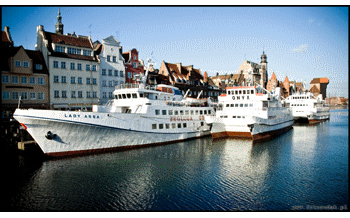
Gdansk – the city of possibilities
A thousand – year – old city, Gdansk lies on Gdansk Bay and the southern coast of the Baltic Sea. With its hanseatic tradition, it has always played a major role in the commercial relationships between Northern and Western Europe on the one hand, and the countries of Central and Eastern Europe on the other hand. That resulted in its wealth and cultural variety.
In its ‘golden age’ the city enjoyed the specific status of a municipal republic. It was also a melting pot of cultures and ethnic groups. The air of tolerance and the wealth built on trade made culture, science, and art flourish in Gdansk.
On the 1st of September 1939 it was here, in Gdansk - Westerplatte, that the Second World War started with the shots fired from the battleship Schleswig-Holstein. It was a time of bravery and martyrdom of Gdansk’s citizens and it opened a new, tragic chapter in the history of Gdansk. The war and the particularly fierce struggle for liberation left Gdansk completely devastated. Its reconstruction, with the help of fully dedicated citizens, took several years. Gdansk once again became the biggest Baltic port and regained its former splendour.
The tragic December 1970, then August 1980 and the martial law period are the successive dates symbolizing the fight of the citizens of Gdansk against the prevailing communist regime. It was Gdansk that became the cradle of ‘Solidarność' which was to transform the map of Europe. History has come full circle…
Contemporary Gdansk - the capital of the Pomeranian province, a dynamically developing city with a population of half a million people - is as vibrant as before. It is practically a part of a bigger city complex – the Tricity – consisting also of Sopot and Gdynia. Gdansk is a vivid maritime, economic, scientific, cultural and tourist centre.
Gdansk has always been a marvellous city, a place which has attracted many famous people: it was the hometown of Isaac van den Blocke, Johannes Hevelius, Gabriel Fahrenheit, Johann Uphagen, Arthur Schopenhauer, Günter Grass and nowadays the Nobel Peace Prize Winner – Lech Wałęsa, the Honorary Patron of the 19th EAS Conference Gdansk 2011.
photo: Piotr Rodak
© EAS GDANSK 2011, All rights reserved, michal.kierzkowski@amuz.gda.pl


























